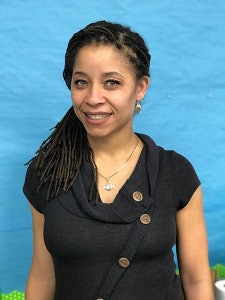Democracy in the United States is at a crossroads with only half of all Americans still having faith in our form of government. To compound the problem, public trust in our institutions cannot go any lower. The good news is that there is a way to restore democracy — our country’s most important uniting principle — and it begins in the classroom.
School is, after all, not only a place where young people acquire knowledge, but also where they learn how to use that knowledge. It is a place where students are shown how to hone in their critical-thinking skills, taught to form and strengthen arguments using history as a guide and encouraged to engage in constructive self-reflection and dialogue. Students learn how to think with each other, how to collaborate, how to make sense of divergent philosophies, how to compromise and ultimately, how to arrive at consensus. In other words, the classroom is learning laboratory for democracy.
 Olawa Gibson
Olawa GibsonHere at The New American Academy Charter School we have made teaching democracy and civics a core part of the curriculum. In Social Studies, we teach children about the importance of debating ideas and the power of voting by allowing students to vote on issues ranging from things as minor as what they want for snack and which play the third-fifth grade theater class will perform, to more serious issues like dealing with the water crisis in Flint, Michigan.
These intense discussions matter greatly because not only do students learn about the issues at hand, such as the importance of clean water, but they also learn about the power of democracy itself. The New American Academy Charter School created this curriculum to help students feel empowered by their support system — their educators and parents. Most importantly, our students are reminded that change is possible through democracy and government works best when there is great compromise, something that seems to be missing right now.
Our current political climate grabs our attention with a never-ending circulation of systemic issues in our society, however, in the midst of this turmoil, we must always remember to prioritize the empowerment and education of our youth. A high-quality education, particularly for students of color, serves as the foundation for providing our children with the fundamental tools to become active citizens and leaders in our communities. As educators, we have the responsibility to ensure that our students have access to tools that they can use in their roles as the leaders of tomorrow.
The future of democracy is at stake unless we begin to equip our students with leadership-centered ideas and values in our classrooms. We must work towards creating curriculums and environments that can foster leadership opportunities for our children and our communities.
As a community, we must help our children develop their voices so that they can contribute to society, allowing them to become vocal figures of leadership in their schools, neighborhoods, and careers. If we can help our youth to become positive and engaged members of society, we can build a safer, healthier and stronger democracy. We must lift our students in every way, especially in Black and Brown communities like ours, not only to encourage participation in democracy through initiatives like voter turnout and community engagement, but also to allow them to grow into strong leaders of tomorrow.
Olawa Gibson is a 5th grade master teacher at The New American Academy Charter School in Brooklyn.



















